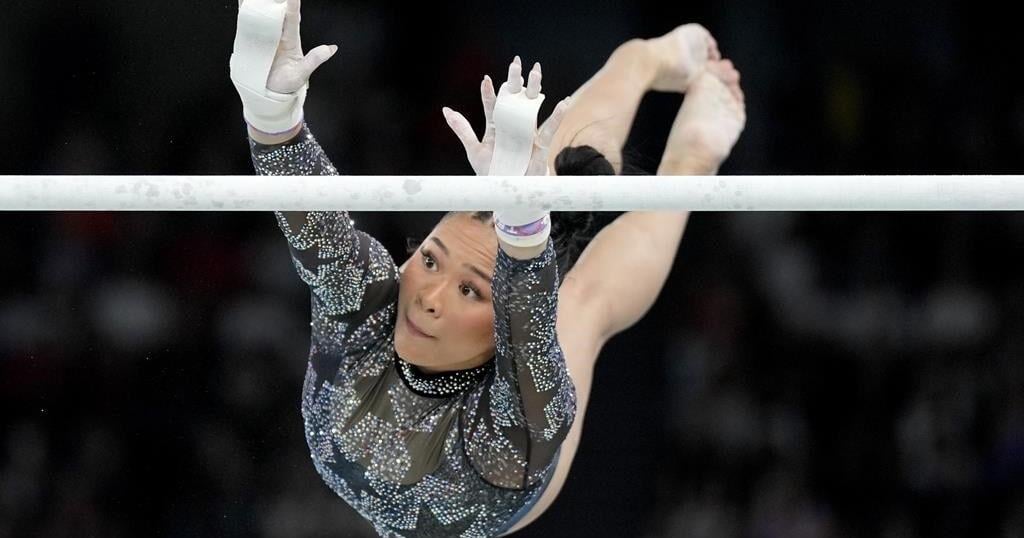Before she cut the air on the world’s biggest sporting stage with head-spinning, gravity-defying moves, Logan Edra, aka B-Girl Logistx, held herself with a razor-sharp focus.
Brows furrowed and hands anchored at her hips, Team USA’s youngest breaker this year seemed more serious than some of her competitors at the Paris Olympics. This was not just a contest for the 21-year-old daughter of Filipino immigrants, but a pressure-packed chance to bring her cultural heritage into a traditionally American art form for all to see.
Representing both Filipinos and immigrant families more broadly was “the most overwhelming part” of breaking on the Olympic stage, Edra said, calling it “a different layer of love.”
As the spotlight now shifts to the Paralympics, athletes like Edra shoulder not only their countries’ hopes for gold, but the responsibility of representing their identities and cultures, which spectators increasingly scrutinize.
Edra did not advance past the quarterfinals in the Paris b-girl competition, but her Olympic journey and current No. 10 world ranking clearly showcase her skill. When an athlete excels at this level, she said, stigma and judgment often give way to respect.
“If someone’s doing a crazy move on their elbows, and they spin on their head — clearly it takes so much human strength. You can’t deny that,” Edra said.
However, this effect of positive exposure can unravel if a minority athlete becomes politically outspoken. It’s a real dilemma: Voicing opinions on a sensitive topic can jeopardize the breadth of their influence, yet remaining silent can feel like betraying their true selves. Navigating this balance between embracing authenticity and preserving respect is a constant challenge.
‘I’ll be Muslim, too’
Social scientists call this dynamic the “parasocial contact hypothesis,” which suggests prejudice can be reduced through positive exposure to athletes or other members of marginalized or stigmatized groups.
Researchers tested the theory by exploring soccer’s influence on Islamophobia in British culture. After Egyptian striker Mohamed Salah, known for his prayers on the pitch, was instrumental in a decisive Liverpool win, viral videos showed British fans celebrating with chants like “If he scores another few, then I’ll be Muslim, too,” and “Mohamed Salah, a gift from Allah. He’s always scoring; it’s almost boring.”
Researchers analyzed 15 million tweets and hate-crime data from 25 police departments, finding a 16% drop in Liverpool-area hate crimes and a halving of anti-Muslim tweets by Liverpool fans after Salah joined the team. Surveys showed Salah’s Muslim identity increased belief in Islam’s compatibility with British values.
Salma Mousa, a political scientist at University of California, Los Angeles, who specializes in prejudice reduction and who co-authored the 2021 study, pointed out the limitations of this influence — she said Salah maintained a “completely apolitical” stance on controversial issues at the time.
Shouldering the burden
“Practically this does place a burden on minority players,” said Ala Alrababah, another co-author of the study and a political scientist at Bocconi University. “As a Muslim player, as a Black player, as an LGBTQ player, or as any other minority, knowing that playing well can improve attitudes or playing badly can worsen attitudes — This is adding pressure. This is tough.”
Whether it’s their intention to or not, minority Olympians become emblematic figures for entire ethnicities or religions.
Gabby Douglas and Simone Biles have ignited waves of Black participation in gymnastics. Sunisa Lee, who in Tokyo became the first Hmong-American and first Asian American to win women’s all-around gold, sparked surges in Google searches for “Hmong” and “What is Hmong descent?” And when Lee began battling an incurable kidney condition after her 2021 win, she raised awareness about high rates of kidney disease among the Hmong American population.
Biles waited until after she had won a sixth gold medal at Paris before posting an apparent reference to the U.S. presidential campaign on X, writing “I love my black job.”
“All sports go way beyond what happens on the field of play, but that is true to a factor of 10 for the Olympic Games,” USA Gymnastics spokesperson Jill Geer told The Associated Press.
Inspiring change
Some civil society groups recruit minority athletes to be ambassadors in prejudice reduction campaigns. Show Racism the Red Card — the U.K.’s largest anti-racism educational charity — offered a 53-page guide on “using the Olympics and Paralympics to educate against prejudice” to teachers across England, Scotland and Wales.
Gilberto Lopez-Jimenez, a 21-year-old sports fan from El Paso, Texas, had more than medals in mind as he rooted for Dominican American gymnast Hezly Rivera and Mexican gymnast Alexa Moreno.
“Mexicans often can be associated with laziness, but Alexa Moreno has been super resilient,” the first-generation Mexican American said. “Because she’s won so much, she’s admired by not just Mexicans but the gymnastics community more broadly, and I think that definitely has reduced some stereotypes and racism.”
The specter of racism looms large in today’s world. Anti-migrant and anti-LGBTQ rhetoric have been fixtures of politics in Europe and the U.S. But the mere presence of minority athletes on podiums like the one shared by three Black Olympic gymnasts this year can advance discussions on race and inclusion, reshape perceptions and ultimately inspire change.
“In Latino cultures, there is this pride. We’re not used to seeing ourselves on the big stage. We’re not used to making it to the podiums. So when we do it’s a big deal, and it brings our country together,” Lopez-Jimenez said. “These athletes — what they do matters a lot.”
___
AP writer Noreen Nasir in Paris contributed.
